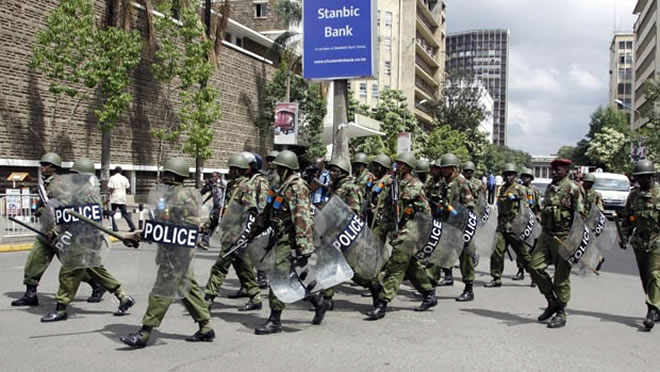
Police patrol near the Supreme Court in Nairobi as the party of Kenya's Prime Minister Raila Odinga files a case with the court over what the claim is massive fraud that took place during the country's March 4 election. (Khalil Senosi/Associated Press)

Saturday, March 16, 2013
Prime Minister Raila Odinga's court filing comes a week after Kenya's election commission declared Uhuru Kenyatta — the son of Kenya's founding father — the winner of the country's March 4 vote. Kenyatta won by a hair, with 50.07 per cent of the vote, breaking the 50 per cent mark by about 8,000 votes out of 12.3 million cast.
Kenya's election has been largely peaceful, unlike the disputed 2007 vote that sparked two months of violence that killed more than 1,000 people.
But downtown Nairobi carried the scent of tear gas Saturday after police threw canisters at Odinga supporters who gathered despite warnings from police. An Associated Press reporter at the scene said the supporters were not demonstrating or being violent when the police lobbed the tear gas.
Later, police lobbed more tear gas at supporters gathered in front of the Supreme Court building.
"It's everyone's right to hold demonstrations, but police will stop demonstrations that may have ramifications on security," said police spokesman Masoud Mwinyi. "Police are taking precautionary measures to warn people to disperse, but if they don't we will use minimum force. Their presence can create unnecessary tension. Already we are seeing pockets of volatility."
The petition filed Saturday asks the court to set aside the announcement by the election commission on March 9 that Kenyatta and his running mate William Ruto had won the presidency and deputy presidency.
Odinga came in second in the eight-candidate field with 43 per cent of the vote. He had hoped to keep Kenyatta under the 50 per cent mark and force a two-man runoff.
The Odinga petition says that the voter register was altered and "mysteriously grew overnight by a large proportion" on the eve of the election. Votes cast exceeded the number of registered voters in several locations, it said, adding that the change in the number of registered voters was to allow the election commission to manipulate the election results.
The petition said that the electronic voter ID and biometric voter registration systems were "so poorly selected, designed and implemented that they were destined to fail," which forced the election commission to revert to a "discredited manual system" that carried risks for abuse and manipulation.
The election commission "failed to establish systems which are accurate, secure, verifiable, accountable and/or transparent and indeed declared results which in many instances had no relation to votes cast at the polling station," the petition said.
If the court upholds Kenyatta's win, he will become the second sitting president in Africa to face charges at the International Criminal Court. He and Ruto both face charges related to having helped orchestrate the 2007-08 postelection violence. Both deny the charges. Ruto's trial begins in late May; Kenyatta's begins in July.
Kenyatta has promised to report to The Hague even if he wins the presidency.
ICC drops Kenyan official's crimes against humanity case
Despite the second straight disputed presidential election, Kenya has for the most part remained at peace during the election period, though vicious online fights between supporters of Kenyatta and Odinga have broken out on Facebook and Twitter.
Odinga has asked for calm from his supporters during a week of news conferences in which his team has claimed the vote was rigged. He has said he will respect the Supreme Court's ruling.
One supporter said Saturday he hoped the court overturns Kenyatta's win.
"We have a lot of faith and confidence that the verdict will reflect the will of the people. Kenyans are not peaceful, they are only calm," said Warega Fredrick, pro-Odinga student who was outside the Supreme Court on Saturday.
Election day did not go as planned. An electronic voter ID system intended to prevent fraud failed across the country for lack of electricity in some cases and overheating computers in others. Vote officials instead used manual voter rolls.
After the polls closed, results were to be sent electronically to Nairobi, where officials would quickly tabulate a preliminary vote count in order to maximize transparency after rigging accusations following the 2007 vote. But that system failed, too. Election officials have indicated that computer servers overloaded but have yet to fully explain the problem.
As the early count system was still being used, election results showed more than 330,000 rejected ballots, an unusually high number. But after the count resumed with the arrival in Nairobi of manual tallies, the number of rejected ballots was greatly reduced, and the election commission said the computer was mistakenly multiplying the number of rejected ballots by a factor of eight.
The U.S., U.K. and Europe are watching the results closely in Kenya, the lynchpin of East Africa's economy. Many African countries have directly congratulated Kenyatta for winning the presidency, but many Western countries including the U.S. and U.K. released statements congratulating Kenyan voters but omitting any mention of Kenyatta.
Source: AP